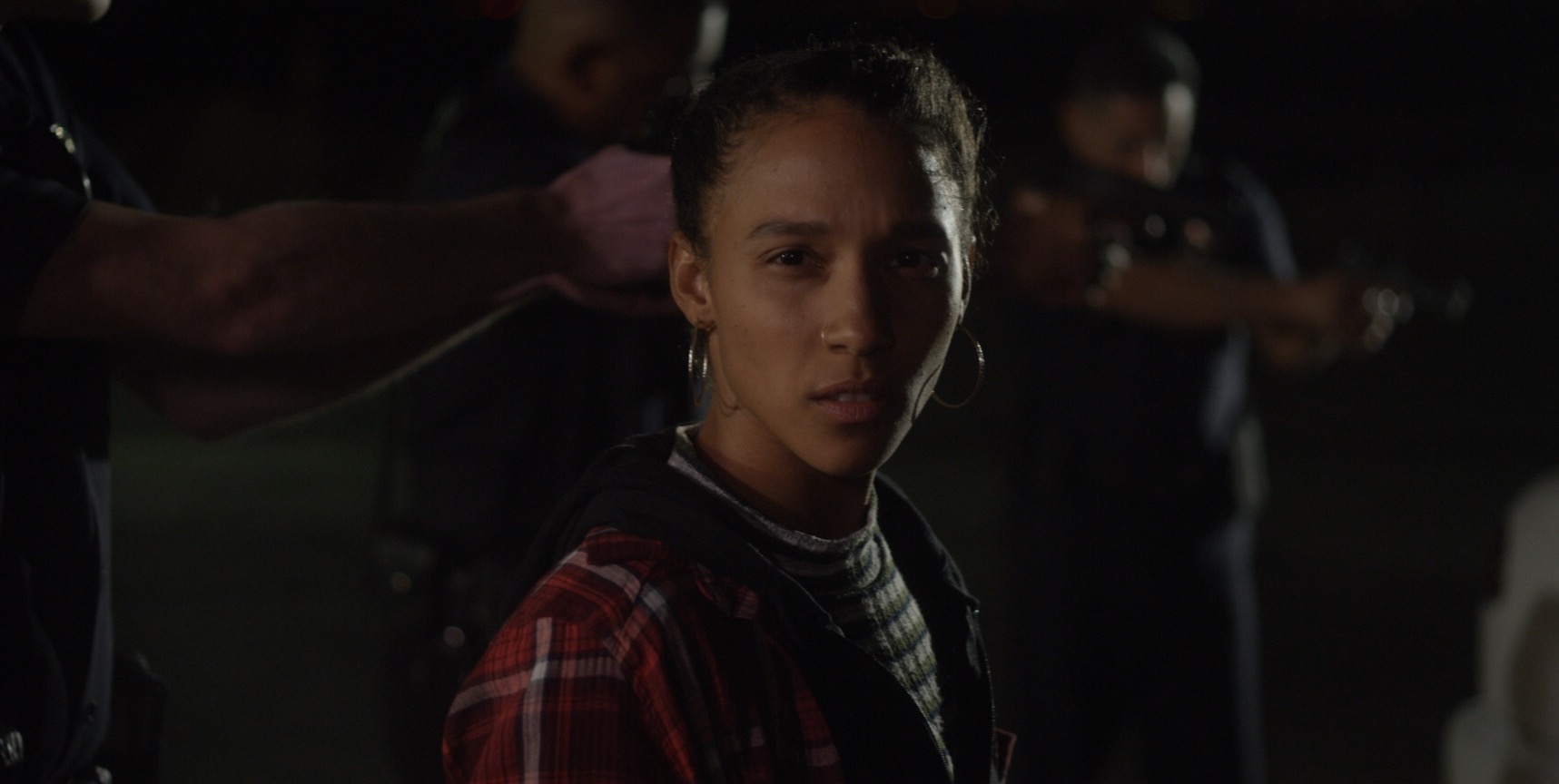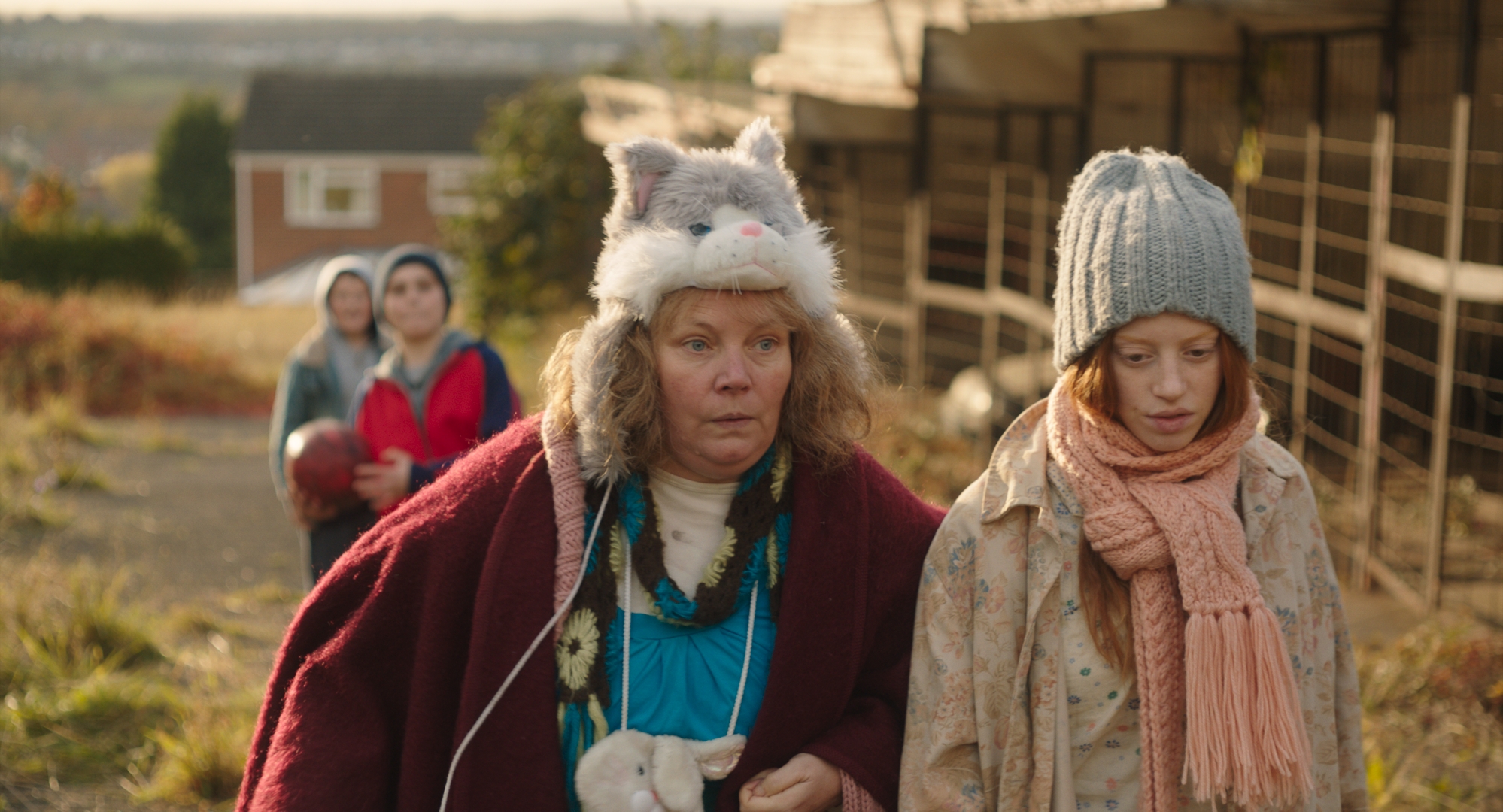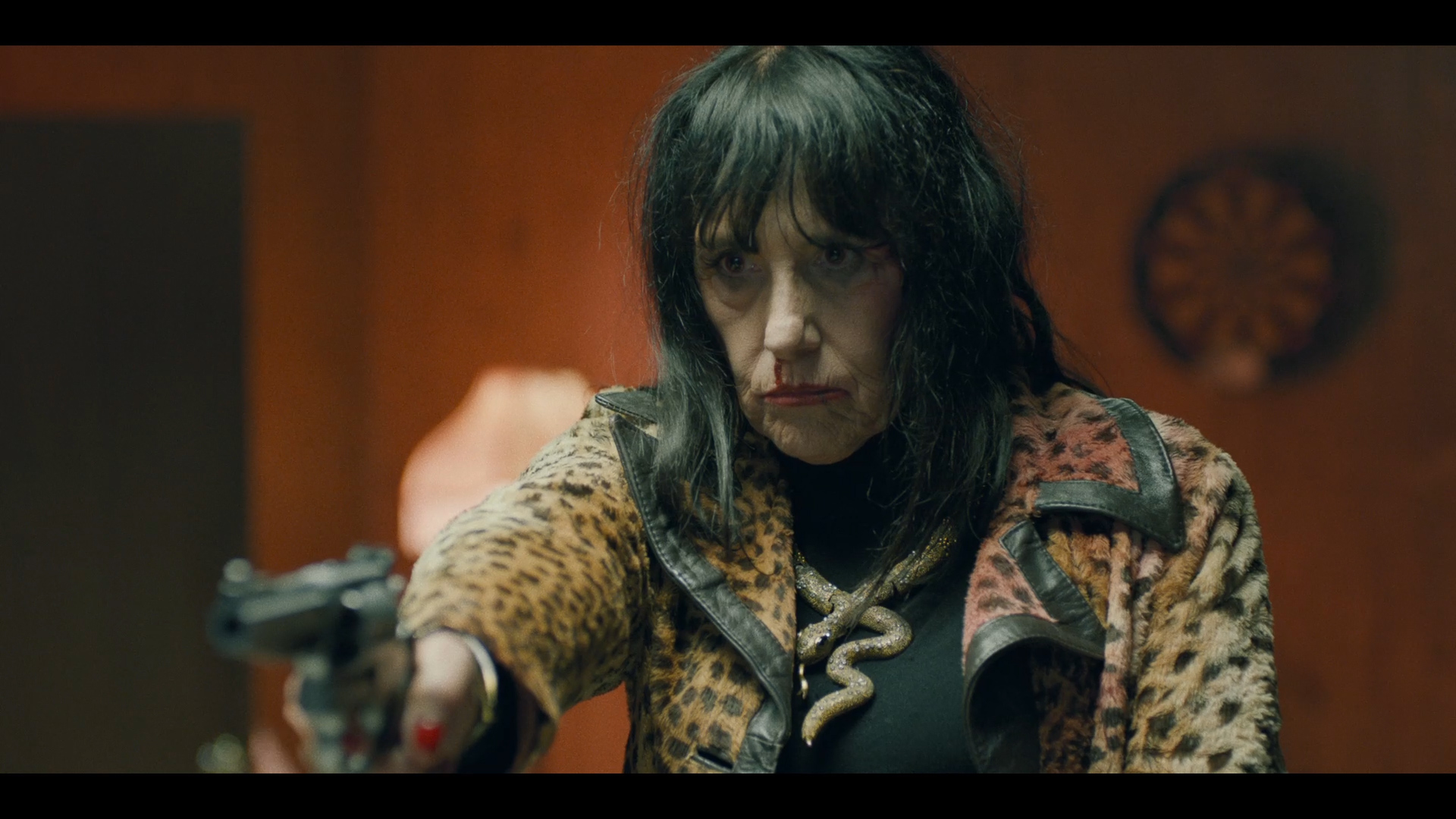Boston Underground Film Festival 2018 Recap

Evan Crean reviews his favorites from the 2018 Boston Underground Film Festival.
Revenge; Coralie Fargeat; France, 2017; 108 min
Both a satisfying film about a woman seeking bloody retribution for her rape, and a scathing commentary about men who cover up the horrific acts of other men. Coralie Fargeat’s Revenge is an emotionally challenging, yet gripping feature-length directorial debut that displays terrifying isolation, graphic violence, and mankind’s worst qualities in the tensest, most breathtaking cinematic format.
In Revenge, Jen (Matilda Anna Ingrid Lutz) travels to a remote vacation home with her boyfriend Richard (Kevin Janssens) for a romantic weekend before his buddies arrive to do big game hunting. Unaware that the married Richard would have a houseguest, Stan and Dimitri are shocked to find Jen there when they show up early. The pair are all too happy to flirt with her and drool all over until Richard leaves, which is when Stan decides she should be with him too and forces himself on her after she tries to deny his advances. When Richard returns and finds out he is furious, although not for the right reasons, he attempts to pay Jen off, or just dispose of her, so his wife won’t find out about his infidelity.
Fargeat doesn’t spend much time on the horrible act of rape itself. Instead, she focuses more on the disgustingness of those that either ignore a woman under attack (Dimitri) or those who try to cover up the crime after the fact (Richard), people that the movie effectively argues are just as bad as rapists themselves because they normalize the rapists’ acts. This realization is a tough but necessary one in the era of #MeToo, where men are learning that they need to believe women and lift their voices instead of trying to silence them if things are going to truly change for the better.
Jen’s struggle to survive in the film is emblematic of the issue literally and metaphorically. She must overcome horrifying obstacles to live, but her quest to dispatch these men who won’t let her speak out is cathartic because they receive the justice they might not normally have received in the real world. By the time the film ends, viewers can let out a sigh of relief that at least these three guys receive their comeuppance, even if so many others in the world haven’t (yet).
The Ranger; Jenn Wexler; USA, 2018; 80 min

Punks are adept at surviving the sketchy back alleys and drug-fueled rock clubs of cities; however, they’re no match for the great outdoors, as evidenced by Jenn Wexler’s entertaining 80s inspired horror flick The Ranger. In the woods, these otherwise resourceful characters don’t know where to seek shelter or how to defend themselves under normal circumstances, so facing off against a homicidal park ranger well-versed in wilderness survival presents a terrifying life-or-death challenge.
The Ranger’s narrative focuses on Chelsea (Chloe Levine), who enjoyed nature with her uncle (Larry Fessenden) at his remote cabin until he met an untimely end, “eaten by wolves,” as a creepy park ranger (Jeremy Holm) explains to her as a child. Fast-forward to the present day, where Chelsea is a young punk living in the city with friends who are selling drugs and trying to hack it as a band. A police raid on their club leads her boyfriend Garth (Granit Lahu) to stab a cop, and in escaping, they decide to hide out at her uncle’s cabin. After they arrive, the punks immediately clash with the ranger, who doesn’t take kindly to their disrespectful attitude toward him or his home. Partially angry they’re violating his rules and partially angry that Chelsea (who he recognizes) has fallen in with the wrong crowd, he decides to teach them all a lesson.
Purposely set in an unspecified terrifying time before cell phones, Wexler’s film skillfully channels inspiration from numerous 80s horror films about teens trying to survive in the woods (including Evil Dead) while also evoking punk rock movies like Ladies and Gentlemen, the Fabulous Stains and Smithereens. Her resulting work is effectively tense as horror and simultaneously presents amusing commentary about the rebels who break rules and those who rigidly enforce them. Furthermore, The Ranger is darkly humorous and satisfying, with some fantastic kills and a quick-witted protagonist who demonstrates incredible strength under pressure.
My Name is Myeisha; Gus Krieger; USA, 2018; 85 min

Based on the Rickerby Hinds play “Dreamscape,” which is based on a true story, My Name is Myeisha is tailor-made for this moment in the American experience. The Boston Underground Film Festival’s opening night picture may take place twenty years ago, but sadly, it couldn’t be more relevant to 2018. This rousing yet heartbreaking movie explores a frustrating topic that continues to be at the forefront of the political conversation in the United States: police violence against people of color. Writer/director Gus Krieger zeroes in on the horror of this issue by exploring the tragedy of a young, bright life snuffed out before its time.
The film’s story follows a 19-year-old woman named Myeisha (Rhaechyl Walker) living in the Los Angeles area, who goes out to party with her friends in the days following Christmas and Kwanzaa. A flat tire threatens to ruin their night, but Myeisha volunteers to stay behind with their car until help can arrive, and while waiting, she falls into a deep sleep. When her friends return later, they’re horrified to learn that they can’t wake her up or open the locked car, which forces them to call the authorities, a necessary decision with unnecessarily fatal consequences.
My Name is Myeisha’s surreal narrative, which leans heavily on Myeisha’s deep dream state, is slightly too episodic, with stage-like monologues that disrupt the film’s flow. However, Myeisha’s captivating rants told through a combination of rap, spoken word poetry, and beatboxing compensate for the film’s uneven rhythm by seizing the audience’s attention from scene to scene. Myeisha’s raw and humorous confessionals on topics like BBQ, body image, Y2K, and the filmographies of Wesley Snipes and Denzel Washington further heighten the tragedy of what happens to her because they create a fully realized portrait of a young woman overflowing with joie de vivre. The most impressive part of this movie is the performance by its lead, Rhaechyl Walker. As Myeisha, Walker is a force to be reckoned with, a magnetic presence who dominates the screen to make Myeisha a character that demands attention and your sympathy. Thanks to her, Myeisha is someone whose essence will stick with you long after the film’s closing credits.
Pin Cushion; Deborah Haywood; UK, 2017; 82 min

Gorgeous but gut-wrenching, Pin Cushion is a haunting debut feature by writer/director Deborah Haywood, which comments on the depth of human cruelty. Its sober story about a mother-daughter pair named Iona (Lily Newmark) and Lyn (Joanna Scanlon), who move to a new town in the hope of starting fresh, is bright and cheerful at its outset, which creates a hopeful feeling that things might be different for them in this new place. In spending more time with this sweet, yet naïve pair, however, it becomes apparent that despite their best efforts to assimilate, they are not going to fit in here either, due to their unusual appearance, penchant for daydreaming, and their timid nature.
Even though Iona is befriended by the popular girls at school, it becomes immediately clear that her friendship with them is not meant to last. Keeley (Sacha Cordy-Nice), the gang’s fierce ringleader, who refers to everyone as “babe,” lulls Iona into a false sense of security by taking advantage of her trust and swiftly alienating her from everyone in town. Sadly, Lyn’s attempts to socialize are met with even crueler consequences from adults who either refuse to acknowledge her or treat her as subhuman because of her hunchback. To make matters worse, Iona does numerous hurtful things to Lyn while trying to fit in with the popular crowd, which drives a wedge in their relationship, too, breaking their once-close bond at a time when they need each other the most. All of the awful things that happen to Iona and Lyn continue to escalate through increasingly horrifying situations until the stress of it all explodes into a conflagration, or more specifically, a fireball.
Haywood’s film is beautiful for its lush, colorful visuals and its ability to create a dreamlike state befitting the adolescent experience. It also reverberates with its observations about society’s brutality toward people who are different. Haywood doesn’t let anyone off the hook with her raw, scathing social commentary. She even challenges viewers that agree with her through the movie’s unforgettable bittersweet ending, where Lyn makes an unspeakable sacrifice to help Iona find a better life. Pin Cushion isn’t an easy watch, but it’s a tremendous directorial debut that’s rewarding for those that possess the emotional fortitude to process its messages alongside the somber events that transpire throughout the film.
The Queen of Hollywood Blvd; Orson Oblowitz; USA, 2018; 90 min

LA crime dramas are a dime a dozen, but every so often, a movie like The Queen of Hollywood Blvd comes along that refreshingly deviates from genre tropes. Writer/director, Orson Oblowitz’s film breaks convention relatively easily by focusing on a protagonist often ignored by the genre: a woman. However, Oblowitz’s main character isn’t merely fascinating for her gender; Mary, aka “Queen Mary,” is more original because she’s portrayed by his mother, Rosemary Hochschild.
The mother-son collaboration at the film’s center is a successful one because their personal relationship creates a believable narrative and tremendous onscreen chemistry. Oblowitz crafts a gripping story of a strip club owner on the eve of her 60th birthday whose club will be taken away by criminal associates to pay outstanding debts and whose son (played by Oblowitz himself) has been kidnapped to ensure she cooperates. Mary’s tale is one that takes place over the course of one very stressful day, where she must fight to save her son and to hang onto the empire she has labored 30 years to build in time to celebrate her birthday. In this quest, it’s plain to see that she is willing to risk everything to get her son back safely, which magnifies the narrative’s emotional impact.
Divided into chapters, the film smartly establishes a sense of scale that makes this single day seem epic based on the number of events that transpire. Oblowitz surprises viewers with shocking moments of violence both committed against Mary and by her to those trying to take everything away from her. The story itself is also an intriguing commentary on the American Dream, playing up Mary’s status as an immigrant to create higher stakes, although it expresses its points on the subject less than subtly. As Mary, Hochschild is captivating, oozing personality every moment she’s on-screen. Late in the film, Oblowitz spends too much time on performances and festivities happening at Mary’s strip club during her birthday party, which should be spent with her during her struggles instead, because Hochschild makes Mary deserving of her title “Queen Mary,” royalty worthy of time and attention.
Let the Corpses Tan; Hélène Cattet and Bruno Forzani; France/Belgium, 2017; 90 min

Tarantino meets Wheatley meets Leone in Hélène Cattet, and Bruno Forzani’s Let the Corpses Tan, a bonkers Mediterranean cops and robbers flick chock full of surreal elements that might be more disruptive if the whole film wasn’t so damn exciting moment to moment. The film’s riveting premise—a peaceful set of ruins where an eccentric author (Marc Barbe) and his girlfriend (Elina Löwensohn) live is taken hostage by a gang of thieves so they can knock over an armored car, and although the crooks succeed in stealing the gold inside, the cops quickly find their way back to the hideout, where an epic shootout ensues.
Let the Corpses Tan’s narrative is frantic and fast-paced—told over a period of 24 hours—a period marked by timestamps on title cards that punctuate the action. Cattet and Forzani show some events from multiple perspectives, which adds to the commotion and plays with the space of the movie’s sprawling location to create a grand sense of scale. During the multi-hour conflict that carries on all night, the gang becomes fragmented as alliances are formed and broken with third-party players, adding an extra layer of tension.
The film’s surreal metaphors about the characters resembling ants and its mad hallucinations by the author about a silhouetted woman dominating men should feel more out of place; however, the movie’s breakneck pace barely gives them a second to distract the audience. The picture’s only real shortcoming is that in the thick of its extremely chaotic scenes, it can be difficult to tell what’s happening and who it’s happening to, particularly at night where darkness shrouds the location. This lack of clarity thankfully represents the single speed bump in an otherwise thrilling ride.
Regions: Massachusettes
